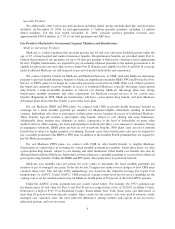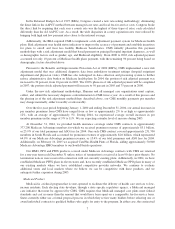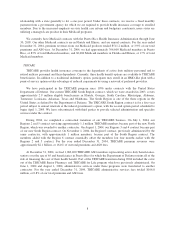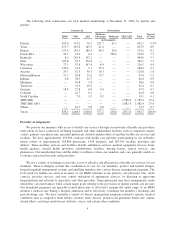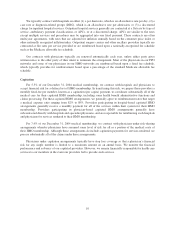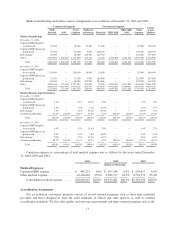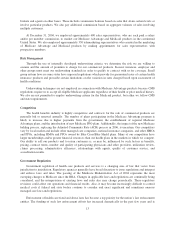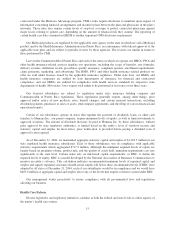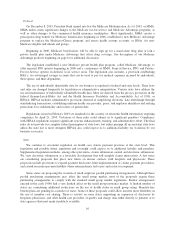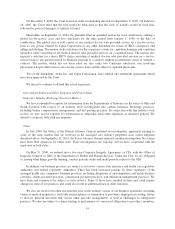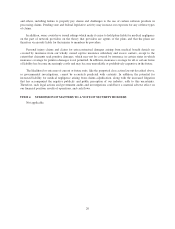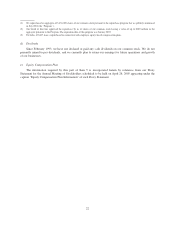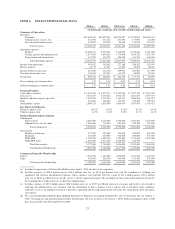Humana 2004 Annual Report Download - page 26
Download and view the complete annual report
Please find page 26 of the 2004 Humana annual report below. You can navigate through the pages in the report by either clicking on the pages listed below, or by using the keyword search tool below to find specific information within the annual report.Federal
On December 8, 2003, President Bush signed into law the Medicare Modernization Act of 2003, or MMA.
MMA makes many significant changes to the Medicare fee-for-service and Medicare Advantage programs, as
well as other changes to the commercial health insurance marketplace. Most significantly, MMA creates a
prescription drug benefit for Medicare beneficiaries beginning in 2006, established a new Medicare Advantage
program to replace the Medicare+Choice program, and enacts health savings accounts, or HSAs, for non-
Medicare eligible individuals and groups.
Beginning in 2006, Medicare beneficiaries will be able to sign up for a stand-alone drug plan or join a
private health plan under Medicare Advantage that offers drug coverage. See description of our Medicare
Advantage products beginning on page 6 for additional discussion.
The legislation established a new Medicare private health plan program, called Medicare Advantage, to
offer regional PPO options beginning in 2006 and a continuance of HMO, Point-of-Service, PPO, and Private-
Fee-for-Service options in defined, local service areas. The legislation also includes a provision establishing
HSA’s, tax-advantaged savings accounts that can be used to pay for medical expenses incurred by individuals,
their spouse, and their dependents.
The use of individually identifiable data by our business is regulated at federal and state levels. These laws
and rules are changed frequently by legislation or administrative interpretation. Various state laws address the
use and maintenance of individually identifiable health data. Most are derived from the privacy provisions in the
federal Gramm-Leach-Bliley Act and the Health Insurance Portability and Accountability Act of 1996, or
HIPAA. HIPAA includes administrative provisions directed at simplifying electronic data interchange through
standardizing transactions, establishing uniform health care provider, payer, and employer identifiers and seeking
protections for confidentiality and security of patient data.
Regulations issued in February 2003 set standards for the security of electronic health information requiring
compliance by April 21, 2005. Violations of these rules could subject us to significant penalties. Compliance
with HIPAA regulations requires significant systems enhancements, training, and administrative effort. The final
rules do not provide for complete federal preemption of state laws, but rather preempt all inconsistent state laws
unless the state law is more stringent. HIPAA also could expose us to additional liability for violations by our
business associates.
State
We continue to encounter regulation on health care claims payment practices at the state level. This
legislation and possible future regulation and oversight could expose us to additional liability and penalties.
Supplemental legislation includes, among other provisions, claims submission content and electronic submission.
We view electronic submission as a favorable development that will simplify claims interactions. A few states
are considering proposals that place new limits on insurer contacts with hospitals and physicians. These
proposals include provisions to expand payment disclosure, limit implementation of claims payment procedures,
and extend an insurer payment liability where intermediaries fail to pay and restrict recoupment.
Some states are proposing the creation of small employer pooled purchasing arrangements. Although these
pooled purchasing arrangements may affect the small group market, most of the proposals require these
purchasing arrangements to comply with the standard small group market regulations. Similar arrangements
enacted in the early 1990s had a very limited affect on the small group insurance market. A limited number of
states are considering additional restrictions on the use of health status in small group rating. Mandate-free
benefit plans are pending in a number of states. Some of these proposals could allow insurers more flexibility in
the use of member cost sharing. There is activity in some states supporting an expansion of disclosure by
hospitals, physicians, and other health care providers of quality and charge data either directly to patients or to
state agencies that must make it publicly available.
16


